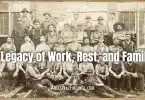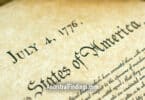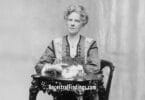Ever wondered why Americans head to the polls on a Tuesday in November? This date isn’t random; it’s a tradition rooted in the everyday realities of early 19th-century America, where agriculture shaped the economy and community life. Choosing the first Tuesday after the first Monday in November was an intentional decision that accommodated the needs of a largely rural, agrarian society, making it possible for as many citizens as possible to vote.
In the early 1800s, farming wasn’t just a job—it was the foundation of American life. Nearly everyone depended on agriculture for food, income, and survival, and farmers, naturally, made up a huge portion of the voting public. So, the timing of Election Day revolved around the agricultural calendar. By early November, most harvests were complete, leaving farmers with fewer daily tasks, and winter’s harsher weather had not yet set in, allowing people in rural areas to travel to polling places without as much risk. For some, voting involved a full day’s journey by horseback or carriage, and by selecting this window between harvest and winter, lawmakers created a date accessible to a rural electorate.
But why Tuesday? This choice, too, came from the patterns of 19th-century life. Most people observed the Sabbath on Sunday, making travel and public activity that day impractical for many communities. By choosing Tuesday, lawmakers allowed people to start traveling on Monday without conflicting with religious observances. Wednesday was also a popular market day in rural towns, where farmers brought goods to trade and sell. Voting on Tuesday avoided disrupting market schedules, essential for farmers whose income and community connections often depended on weekly market day.
There’s also a strategic reason behind choosing the first Tuesday after the first Monday. This timing allowed the election to fall after the first of the month, when people typically settled debts or paid rent. At a time when financial stability was often tenuous, lawmakers hoped to avoid the pressures of rent day that could weigh heavily on citizens’ minds. By giving some space after the first of the month, they aimed to create a sense of freedom and focus for voters, ensuring they weren’t rushing through decisions or even deterred from voting due to financial concerns.
Beyond the agricultural and economic concerns, the timing reflects the slower pace of communication in that era. In the 1800s, information didn’t travel at the speed we’re used to today. News circulated by word of mouth, local gatherings, or newspapers that might reach rural areas only weekly. By setting a predictable and fixed election date, Congress ensured that everyone knew well in advance when to expect the election, giving voters the time they needed to prepare and travel. This consistency in timing was critical for the far-flung communities that made up much of America’s landscape.
As the United States has grown and transformed, so have the challenges facing voters. Farming is no longer the backbone of American life, and far fewer people live according to the agricultural calendar. Today’s voters are often balancing busy weekday schedules with limited flexibility, which has led to discussions about whether Tuesday voting still serves modern needs. Ideas like moving elections to weekends or making Election Day a national holiday have gained traction, with advocates arguing that these changes could increase voter turnout and accessibility for Americans juggling work, family, and other obligations.
Yet, the endurance of the Tuesday election date speaks to a deep-rooted tradition in American democracy. Holding elections on a single, fixed day was once a critical means of ensuring fair participation across the nation’s vast distances, even when transportation and communication were slow and difficult. This consistency helped make Election Day part of the national consciousness, an unchanging fixture that added stability and trust to the democratic process. Even as the nation has evolved, Election Day has remained a testament to the early compromises made to balance civic duty with daily life.
The placement of Election Day is more than just a date on the calendar—it’s a reflection of the values and practical concerns that shaped early American life. As conversations continue about ways to modernize voting practices, this seemingly small detail gives us a window into the past, reminding us of the compromises made to give citizens, many of them rural farmers, a voice. Understanding this legacy encourages us to think carefully about how best to serve today’s diverse, ever-evolving electorate, ensuring that the American tradition of voting continues to reflect the lives and needs of its citizens.
For those interested in exploring this topic further, here are some fascinating reads:
- Election Day: An American Holiday, An American History by Kate Kelly
- The Right to Vote: The Contested History of Democracy in the United States by Alexander Keyssar
- American Suffrage: From Property to Democracy, 1760-1860 by Chilton Williamson






